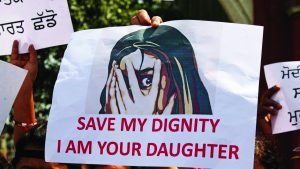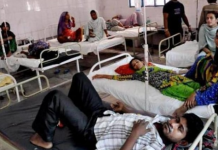 Violence against women and girls is among the most universal and pervasive human rights violations. And India, according to a recent survey by Thomson Reuters Foundation, is the most dangerous country for females, worse than Syria, Iraq and the Congo. Sadly, the country, which among other form of violations has seen a huge spike in sexual assaults in past few years despite tightening of rape laws in 2013, is witnessing a new trend of naming and shaming the rape victims, even if they are minors, and siding with the abusers.
Violence against women and girls is among the most universal and pervasive human rights violations. And India, according to a recent survey by Thomson Reuters Foundation, is the most dangerous country for females, worse than Syria, Iraq and the Congo. Sadly, the country, which among other form of violations has seen a huge spike in sexual assaults in past few years despite tightening of rape laws in 2013, is witnessing a new trend of naming and shaming the rape victims, even if they are minors, and siding with the abusers.
In this backdrop, the latest decision of the Supreme Court to bar media organisations and law enforcement agencies from disclosing the identity of sexual assault victims is a step in the right direction. The country’s apex court has set guidelines, suggesting that the names of victims cannot be used at public rallies or on social media platforms.
“Police or forensic authorities cannot disclose the names of rape survivors either, even with the consent of parents,” the Supreme Court verdict said. “Also, First Information Reports of sexual assault cases, especially those involving minors, should not be put in the public domain.”
The rape of minor girls, according to the National Crimes Records Bureau, increased by 82 per cent in 2016 against the previous year. The number of reported rapes of children, as per the official crime data, rose from 8,541 in 2012 to 19,765 in 2016.
This is ironic as Prime Minister Narendra Modi had launched the national programme called Beti Bachao (Save Our Girls) in 2015. The initiative did little to curb large-scale human rights violation against the vast majority of India’s 650 million girls and women of the country.
Agreed that women in India are traumatised in less obvious ways. They don’t face tanks in the streets, bombs or warlords. But they are killed slowly and the oppression starts innocuously. It begins with girl children being locked up in their own homes. The unbalanced sex ratios at birth, even in educated and rich families, could be a pointer to the patriarchal attitude of the society against women. In the name of teaching the essence of good womanhood, a girl child in general is trained to remain silent even if she is violated. The government surveys show that about 42 per cent of girls in the country have been sexually abused.
It’s not that nothing is being done to reduce assaults against females in the country. The country’s lower house of parliament passed a bill in July 2018 that will see the death penalty handed out to anyone convicted of raping a child under 12. In 2013, following the outrage over the rape and murder of a medical student aboard a moving bus in the capital Delhi, the government announced that capital punishment for those convicted of rape resulting in death. Despite such stringent laws being introduced, death is prescribed only in the rarest of rare cases — the interpretation of which is left to the court. The country’s last execution was on 30 July 2015.
The sexual assault victims, meanwhie, are named and shamed, making their lives even more difficult. The latest judgement, which bans naming and identifying rape victims, including those who had died, will surely come as relief for sufferers.
letters@tehelka.com











